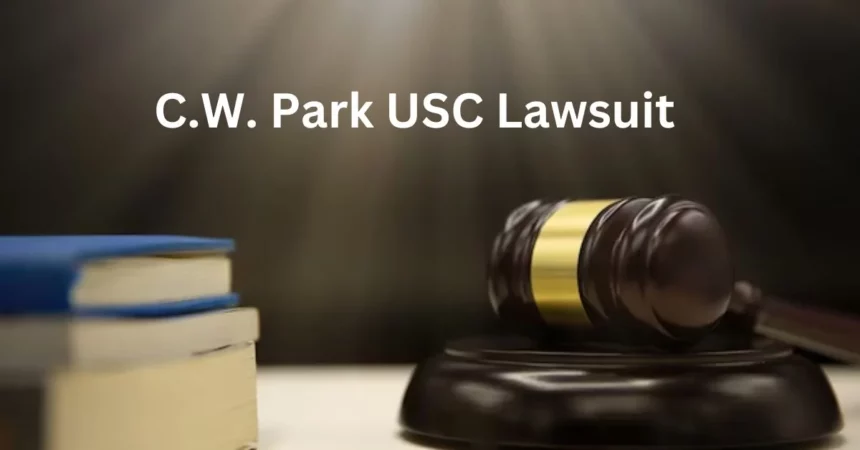C.W. Park USC Lawsuit – a case that has sent shockwaves through academia and sparked conversations about accountability, transparency, and justice. In this gripping exposé, we will explore the allegations against Dr. C. W. Park, their impact on USC and its students, responses from both parties involved, and shed light on similar cases in higher education institutions. Join us on this journey as we unravel the layers of controversy surrounding this lawsuit and discuss why addressing sexual misconduct is crucial for universities everywhere. Brace yourselves for an eye-opening read!
Overview of the Allegations against Dr. C.W. Park
W. Park, a renowned professor at the University of Southern California (USC), has recently found himself at the center of serious allegations that have sent shockwaves through the academic community and beyond. These allegations are deeply troubling, as they involve claims of sexual misconduct and harassment against Dr. Park.
The allegations against Dr. Park paint a disturbing picture of abuse of power and disregard for professional boundaries within the university setting. Multiple individuals have come forward with accounts detailing instances where they felt uncomfortable or violated by Dr. Park’s actions.
It is important to note that these are only allegations at this stage, and it is crucial to allow for due process and fair investigation before passing judgment or making assumptions about guilt or innocence.
Nevertheless, regardless of the outcome, these allegations highlight an underlying issue in academia – the need for more robust systems to prevent and address incidents of sexual misconduct and harassment. Universities must prioritize creating safe environments where students can learn without fear of exploitation or mistreatment.
These allegations also raise questions about accountability within higher education institutions like USC. How did such behavior go unnoticed or unaddressed for so long? Are there systemic failures that allowed this misconduct to persist?
While USC has taken steps towards addressing these concerns by launching an investigation into Dr. Park’s conduct, it is clear that more needs to be done across all universities to ensure proper reporting mechanisms are in place, bystander intervention training is provided, and survivors feel supported when coming forward with their experiences.
In recent years, similar cases have emerged from other prestigious universities around the world – shining a light on a pervasive issue within higher education institutions globally. These cases demonstrate how essential it is for universities to actively combat sexual misconduct rather than sweep it under the rug to maintain their reputations.
Impact on USC and its Students
W. Park USC’s lawsuit has profoundly impacted the university and its students, creating an atmosphere of uncertainty and concern. The allegations against Dr. C. W. Park have shaken the campus community, raising questions about trust and safety.
For many students, this lawsuit has shattered their perception of USC as a safe space for learning and growth. It’s disheartening to think that such misconduct could occur within the institution that is supposed to guide and educate us.
The impact goes beyond just emotional distress; it also affects academic pursuits. Students may find it difficult to focus on their studies with these allegations looming over them. Trust in faculty members may be eroded, making it challenging to engage in classroom discussions or seek guidance from professors.
Moreover, this controversy tarnishes USC’s reputation as a leading educational institution. Prospective students who were once attracted by its prestigious name may now hesitate before applying or attending.
In response to these concerns, USC must take decisive action to address the situation head-on. This includes implementing stronger policies against sexual misconduct, providing support services for affected students, and fostering an environment where victims feel empowered to speak out without fear of retaliation.
The impact of this lawsuit extends far beyond just one individual or department at USC – it affects every member of the school community. It serves as a reminder that universities must prioritize student safety above all else and work tirelessly toward preventing any form of sexual misconduct on their campuses.
Responses from USC and Dr. Park
W. Park broke, both USC and Dr. Park were swift to respond. USC issued a statement expressing deep concern for the alleged misconduct and emphasizing its commitment to addressing such issues promptly and thoroughly.
Dr. Park, through his legal representation, vehemently denied the allegations, stating that they were false and defamatory. He expressed confidence in his innocence and vowed to cooperate fully with any investigation conducted by the university or law enforcement agencies.
In response to these serious allegations, USC has initiated an internal investigation into the matter, promising transparency throughout the process. They have also reached out to students who may have been affected by this situation, offering support services such as counseling.
While it is important to give both parties an opportunity for due process and a fair investigation, it is equally crucial that survivors feel heard and supported during this challenging time.
As more information becomes available regarding this case, it will be interesting to see how both USC and Dr. Park continue to address these allegations while maintaining their respective positions on the matter.
Addressing cases of sexual misconduct in higher education institutions requires not only a thorough investigation but also comprehensive policies that prioritize survivor safety and well-being over reputation management.
As we navigate through this difficult chapter at USC, we must learn from past mistakes within academia as well as society at large when dealing with similar cases of alleged misconduct involving individuals in positions of power.
By actively listening to survivors’ stories without judgment or skepticism while implementing robust preventative measures against sexual harassment on campuses nationwide can universities truly create safer environments for all students.
Holding perpetrators accountable sends a powerful message about zero tolerance for sexual misconduct within educational institutions – ensuring justice prevails regardless of one’s position or influence.
Discussion of Similar Cases in Higher Education
Sexual misconduct allegations and lawsuits are unfortunately not uncommon in higher education institutions. Universities across the United States have faced similar cases where students or faculty members have come forward with allegations of harassment, assault, or other forms of misconduct.
One well-known case that garnered significant media attention was the Larry Nassar scandal at Michigan State University. Nassar, a former physician for USA Gymnastics and Michigan State University, was accused by numerous female athletes of sexual abuse under the guise of medical treatment. The case shed light on the systemic failures within both the university and sports organizations to protect their athletes from such abuses.
Another notable case is that of Harvey Weinstein’s affiliation with universities such as Harvard and USC through guest lectures and donations. Weinstein has been accused by multiple women in Hollywood of sexual harassment and assault. His association with prestigious educational institutions raises questions about accountability when it comes to accepting funds from individuals who may later be involved in scandals.
These cases highlight the need for universities to take swift and decisive action when allegations arise, ensuring a safe environment for all students and staff members alike. It also emphasizes the importance of implementing comprehensive policies on reporting procedures, prevention measures, and support systems for survivors.
Universities must prioritize addressing these issues head-on rather than sweeping them under the rug to protect their reputation. By doing so, they can demonstrate their commitment to fostering a culture free from sexual misconduct while providing appropriate resources for survivors seeking justice.
Society as a whole must engage in open discussions about these cases to raise awareness, challenge existing power dynamics, and hold accountable those responsible for perpetuating harm within academic settings. Only then can we hope to create lasting change that ensures safety within our educational institutions.
The Importance of Addressing Sexual Misconduct in Universities
Sexual misconduct is a pressing issue that universities cannot afford to ignore. It not only affects the victims directly involved, but also creates a toxic environment that hinders learning and personal growth for all students. Addressing sexual misconduct in universities is crucial for fostering a safe and inclusive campus culture.
By actively addressing sexual misconduct, universities send a powerful message: they prioritize the well-being of their students above all else. This commitment to creating an environment free from harassment and assault promotes trust, allowing students to focus on their academic pursuits without fear or distraction.
Moreover, addressing sexual misconduct demonstrates accountability. Universities must hold perpetrators accountable for their actions and implement disciplinary measures accordingly. This not only provides justice for survivors but also sends a clear message that such behavior will not be tolerated within the institution.
In addition, addressing sexual misconduct creates an opportunity for education and prevention. By implementing comprehensive training programs and awareness campaigns, universities can educate their community about consent, healthy relationships, bystander intervention, and resources available to survivors.
Furthermore, taking proactive steps to address sexual misconduct helps attract prospective students who value safety as a priority when choosing where to pursue higher education. A university’s reputation hinges on its ability to provide a secure learning environment where everyone feels respected and protected.
By prioritizing the importance of addressing sexual misconduct within their own institutions, universities contribute positively towards broader societal change. They play an essential role in shaping future leaders who will go on to influence policies and practices surrounding this issue in various sectors.
Frequently Asked Questions
- What is the C.W. Park USC Lawsuit about?
- The lawsuit revolves around serious allegations of sexual misconduct and harassment against Dr. C.W. Park, a renowned professor at the University of Southern California (USC).
- What are the specific allegations against Dr. C.W. Park?
- The allegations include claims of abuse of power and disregard for professional boundaries, with multiple individuals coming forward with accounts of feeling uncomfortable or violated by Dr. Park’s actions.
- How has the lawsuit impacted USC and its students?
- The lawsuit has created an atmosphere of uncertainty and concern at USC, affecting both emotional well-being and academic pursuits. Trust in the institution and faculty may be eroded, impacting students’ ability to engage in learning.
- What has been USC’s response to the allegations against Dr. Park?
- USC has expressed deep concern for the alleged misconduct and has initiated an internal investigation. The university has also offered support services to affected students and emphasized transparency throughout the process.
- How has Dr. C.W. Park responded to the allegations?
- Dr. Park, through legal representation, has vehemently denied the allegations, describing them as false and defamatory. He has expressed confidence in his innocence and pledged full cooperation with any investigation.
- Are these allegations proven, or are they still under investigation?
- At this stage, these are allegations, and it is crucial to allow for due process and a fair investigation before passing judgment. The article emphasizes the importance of awaiting the investigation’s results.
- Are there similar cases in higher education institutions, and how do they compare?
- The article discusses other notable cases of sexual misconduct in higher education, drawing parallels with the need for swift action, comprehensive policies, and a commitment to survivor safety.
- What impact does this lawsuit have on USC’s reputation?
- The lawsuit has raised questions about USC as a safe space for learning and growth. It discusses potential implications for the institution’s reputation and the hesitancy of prospective students to apply or attend.
- Why is addressing sexual misconduct crucial for universities?
- The FAQs highlight the broader importance of addressing sexual misconduct, emphasizing the impact on victims, the need for accountability, and the role of universities in fostering safe and inclusive campus cultures.
- What can universities do to prevent and address sexual misconduct?
- The article suggests proactive steps, including implementing robust reporting mechanisms, providing bystander intervention training, and fostering an environment where survivors feel supported when coming forward.
- What is the broader societal impact of addressing sexual misconduct in universities?
- The FAQs discuss how universities contribute to societal change by prioritizing the well-being of their students, shaping future leaders, and influencing policies surrounding sexual misconduct in various sectors.
- How can readers engage in discussions about these cases and contribute to change?
- The article encourages open discussions, awareness campaigns, and the importance of actively listening to survivors, emphasizing the role of society in challenging power dynamics and holding perpetrators accountable.
Conclusion:
W. Park, it is evident that sexual misconduct continues to be a pervasive issue in higher education institutions. The impact on USC and its students cannot be understated, as trust has been broken and a dark cloud hangs over the university.
While responses from both USC and Dr. Park have been provided, an unbiased investigation must take place to uncover the truth behind these allegations. Transparency is essential in rebuilding trust within the USC community and ensuring justice for all parties involved.






